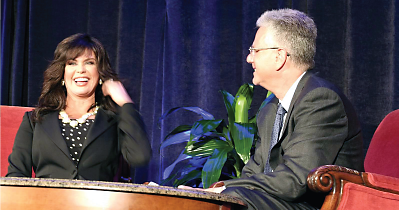Company Makes Big Investment in Employees’ Mental Health
Abstract
Providing mental health services to employees takes more than just adding a line to a company’s insurance policies, as one Midwestern corporation has demonstrated.
Chesapeake Energy Corporation, based in Oklahoma City, approaches suicide prevention and mental health issues through a variety of communication, educational, and programmatic means.

Singer Marie Osmond talks with Jeffrey Borenstein, M.D., about her experience with postpartum depression. The two appeared before 400 primary care physicians and other clinicians in Oklahoma City at a forum sponsored by Chesapeake Energy and coordinated by the American Psychiatric Foundation’s Partnership for Workplace Mental Health.
The company’s increased effort arose after one of its executives lost friends to suicide three years ago. He reasoned that a significant number of Chesapeake’s 10,000 employees might be facing serious emotional stress, leading the company to go beyond including mental health parity in its insurance policies to active engagement with workers.
The company developed “Your Life Matters,” a communication campaign aimed at employees and added a depression screening tool (based on the PHQ-9) to the voluntary standard health-risk assessment used by its employee assistance program.
That program also instituted round-the-clock phone contacts, manager training, and expanded coverage to its legal, financial, child-care, and elder-care services.
Chesapeake CEO Aubrey McClendon appeared in a video explaining that “Your Life Matters” would address needs that traditional programs hadn’t been able to address.
The company didn’t stop there. In March, singer Marie Osmond spoke to employees about how she sought help for postpartum depression and coping with the aftermath of the suicide of one of her children.
The singer’s appearance was part of a daylong series of events for both employees and the local medical community.
Osmond and Psychiatric News Editor-in-Chief Jeffrey Borenstein, M.D., addressed primary care clinicians of all kinds at an evening meeting. Borenstein is also the host of the PBS series “Healthy Minds.”
“About 400 physicians, therapists, and other members of the health care community along with their spouses participated in a very informative, educational, clinically enlightening, and enjoyable [program],” said psychiatrist R. Murali Krishna, M.D., president of INTEGRIS Mental Health and president-elect of the Oklahoma State Board of Health. “There is no doubt there will be increased awareness of clinical depression by primary care physicians and other medical specialists.” Krishna has worked with Chesapeake on the “Your Life Matters” campaign.
“We told our listeners that they are the first line of defense for mental illness,” said Borenstein, who appeared on behalf of the Partnership for Workplace Mental Health, a program of the American Psychiatric Foundation. “Patients have to be screened for depression, anxiety, and chemical dependency, and clinicians need to be informed that there are good tools to help with diagnosis and monitoring, even when they are pressed for time.”
In a separate video interview with the Daily Oklahoman newspaper, Borenstein sought to allay the stigma that often gets in the way of seeking treatment for mental health issues, emphasizing that there is no reason to suffer in silence. “Treatment is effective,” he pointed out.
He reiterated for the general audience that treatment could include not only medication, but talk therapy, exercise, proper sleep habits, and diet—“treating the whole person.”
“The event with Marie Osmond and Jeff Borenstein is but one example of Chesapeake Energy’s investment in promoting overall wellness,” Oklahoma Commissioner of Health Terry Cline, Ph.D., the former head of the Substance Abuse and Mental Health Services Administration, told Psychiatric News. “As a large business, it is apparent that Chesapeake understands that an investment in the mental health of its employees is a good bottom-line investment,” said Cline, who attended the event. 
An article in Mental Health Works about Chesapeake’s program is posted at www.nxtbook.com/nxtbooks/apf/mentalhealthworks_2011q3/#/22.
A video of Borenstein’s interview with the Daily Oklahoman can be accessed at http://newsok.com/marie-osmond-speaks-in-oklahoma-city-about-seeking-help-for-depression/article/3661046.



